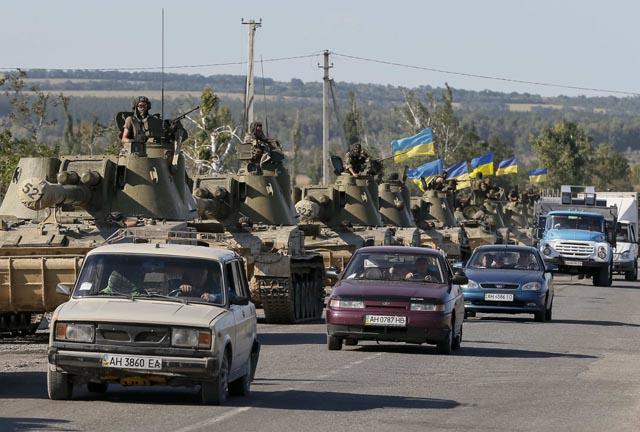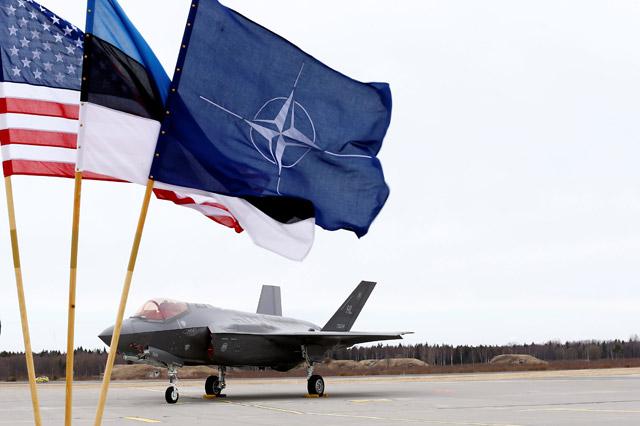You are here
Obama casts Russia as threat to peace in Europe
By AP - Sep 03,2014 - Last updated at Sep 03,2014

TALLINN, Estonia — Lashing out at Russia, President Barack Obama on Wednesday cast Moscow's aggression in Ukraine as a threat to peace in Europe. He vigorously vowed to come to the defence of NATO allies that fear they could be Vladimir Putin's next target.
"You lost your independence once before," Obama said following meetings with Baltic leaders in the Estonian capital of Tallinn. "With NATO, you'll never lose it again."
Obama, who faces criticism in the US for being too cautious in confronting Russian President Putin, sharply condemned Moscow's provocations. He declared in blunt terms that Russian forces that have moved into Ukraine in recent weeks are not on a humanitarian or peacekeeping mission, as the Kremlin has insisted.
"They are Russian combat forces with Russian weapons in Russian tanks," he said during a speech at a packed concert hall.
Obama also took aim at one of Russia's main rationales for its provocations in Ukraine: The protection of Russian speakers living outside its borders. Like Ukraine, Estonia and other Baltic nations have sizeable Russian-speaking populations, compounding their fears that Moscow could seek to intervene inside their borders.
"We reject the lie that people cannot live and thrive together just because they have different backgrounds or speak a different language," Obama said.
Despite the president's tough talk, the US and Europe have been unable to shift Putin's calculus in the months-long crisis in eastern Ukraine. While multiple rounds of Western sanctions have damaged Russia's economy, the penalties have not pushed Putin to end what the White House says is unfettered support for pro-Moscow separatists who have stirred upheaval in key cities.
Obama offered no new options for penalising Russia beyond more sanctions, and reiterated his opposition to getting involved in the conflict militarily.
Shortly after the president arrived in Estonia Wednesday morning, there was a brief flicker of hope for a resolution to the conflict. The Ukrainian president's office announced that it had reached a ceasefire agreement with Putin. But the statement was ambiguous, and a top rebel figure quickly said no ceasefire was possible without Ukraine withdrawing its forces.
Estonia and other countries in the region that were once under Soviet control have been warily eying Putin's aggression and fear he could set his sights on their nations next. Unlike Ukraine, the Baltic states of Estonia, Latvia and Lithuania are NATO members, and have been seeking firm commitments that the US and other alliance powers would come to their defence if Russia were to encroach on their territory.
Obama's three-day trip to Europe is aimed at offering just those assurances. Following a meeting with the leaders of Estonia, Latvia and Lithuania, he declared that the US commitment to security of NATO's newest members runs deep.
"We will defend our NATO allies — every ally," he said. "In this alliance, there are no old members or new members, no senior partners or junior partners — there are just allies, pure and simple. And we will defend the territorial integrity of every single one."
Obama's comments were welcomed by Estonian President Toomas Hendrick Ilves, who said the US commitment to his country has "helped set an example for other NATO allies". Still, he continued to push for a more persistent NATO military presence in his country, something some allies have been loath to do because of a 1997 agreement with Russia in which the alliance agreed not to put permanent bases on Russia's borders.
"I would argue this is an unforeseen and new security environment," Ilves said.
Obama departed Estonia Wednesday evening for Wales, where a high-stakes NATO summit will get underway Thursday. The alliance is expected to approve plans to station more troops and equipment in Eastern Europe, with the aim of building a rapid response force that could deploy within 48 hours.
He addressed US and Estonian troops at the airport before leaving.
"You're sending a powerful message that, as NATO allies, we stand together," Obama said. "We stand as one."
He earlier had announced that he was sending more air force units and aircraft to the Baltics, and called Estonia's Amari Air Base an ideal location to base those forces.
Obama is the second sitting American president to visit Estonia, following president George W. Bush, who traveled here in 2006. Upon his arrival, Obama wrote in a guest book that it was an honour to visit "a nation that shows what free people can achieve together”.
The Baltics were invaded by the Soviet Union and Nazi Germany during World War II. After the Soviet Union crumbled, the Baltic countries turned to the West and joined the European Union and NATO in 2004, much to the chagrin of Russia.
Related Articles
AMARI AIRBASE, Estonia — Two of the US Air Force's newest and most advanced jets landed in the Baltic state of Estonia for the first time on
WARSAW — The presidents of nine NATO countries in central and eastern Europe declared on Sunday they would never recognise the annexation by
Russia launched major military exercises Thursday, with thousands of troops taking part in war games across the country, including in the annexed Crimean peninsula and southern regions near Ukraine.













